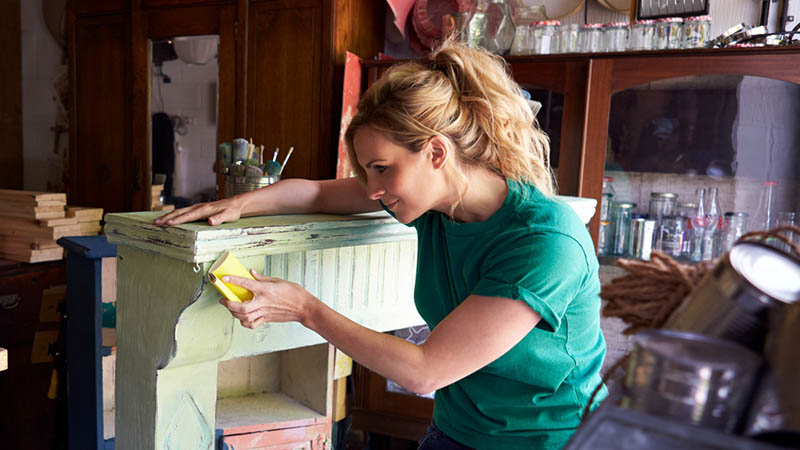As lockdown drags on, there’s actually been a lot of positive news about the house-hunting process, with innovative professional processes and technology making property search, purchase and moving home viable.
As an important step towards putting your current home on the market while you search for a brand new one, you may be looking around your home and wondering if it's worth having a bit of a clear-out – making it tidy and then keeping it tidy.
Here, Scott Hawthorne, a waste disposal expert from SkipsAndBins.com, shares his tips for tackling your clutter responsibly during the COVID-19 crisis...
Since mid-March, the majority of us have been forced to remain inside because of the current COVID-19 pandemic. With more time being spent indoors, there's a good chance that you've been casting your eye inwards and noticing some things you'd like to change or some clutter you'd like to ship out.
However, with many recycling centres and charity shops closed, it may prove difficult or impossible to dispose of large amounts of waste that build up after a good old clear-out. And, with all essential services stretched at the moment, it's important that we deal with any unwanted clutter responsibly to avoid putting extra stress on them.
All this being said, it's still possible to have a clear-out during lockdown. To help you out, here are my top tips for doing just that.
Utilise your spare home storage
While you may be focused on clearing out the areas you spend most time, try to remember the space you may have available to store items in less frequented rooms. While this might sound like moving clutter around and not getting rid of it, if you keep it in a space you don't frequent as often, such as a spare room, garage, loft, or shed, it will be out of sight during this crisis and will free up your main living areas.
So, think about storing non-organic waste (i.e. anything that won't rot) in an underused spot until you can get rid of it responsibly. You could even bag or box up clutter with labels so you can easily organise disposal without having to sift through it again at a later date.
Use your regular bin collection (responsibly)
In most areas, regular waste collection services are running normally (check your council website), so you will be able to get rid of clutter via your wheelie bins. Provided you have room in addition to your usual household waste, there's no reason you can't top up bins with some clutter. You'll need to do this mindfully, however, taking care not to overfill or mix up recycling to ensure collectors can do their job without having to deal with extra mess.
Please note: If someone in your household suffers COVID-19 symptoms, you'll need to deal with their potentially contaminated waste differently. Please see your local council's website for guidance. It's generally advised to use separate, double-bagged sacks for their waste and to leave it for 72 hours before putting it in your wheelie bin.
 Upcycle and repair items
Upcycle and repair items
Have you got an item that you want to throw away because it's broken? Why not repair it? There are lots of online tutorial videos and articles to walk you through carrying out basic fixes that will give an item an extended life and save it from the scrapheap.
Likewise, if you have belongings unwanted items around that are destined for the bin or look tired, why not repurpose them? For instance, a large cardboard box could be fashioned into a lockdown play den for the kids, or, you could be more ambitious and repaint and weatherproof an old set of drawers to be used as planters in the garden. Check décor websites, as well as the likes of Pinterest, for lots of inspiration.
Start a compost heap or bin
Composting is a great way to dispose of household waste and free up space in your wheelie bin. There are tonnes of items that can be added to compost, from green waste, like garden trimmings, fruit and veg scraps, and tea bags, to brown waste, such as paper and cardboard. All of these items will decompose naturally, giving you some nutritious fertiliser for your garden.
Getting into composting is easy and possible with limited space — you can even do it on a balcony! The BBC's composting guide will help you get started and find the right method that suits your home, whether that's a heap or a bin.
Keep up your mindful decluttering habits
Having a decluttered home will give you more breathing space, and you will really appreciate it if we're under lockdown for the foreseeable future. However, you need to make sure that you keep on top of your tidy habits if you want to maintain a spacious home.
Start by being more mindful about your buying habits to avoid unwanted purchases — ask yourself if you actually need any new item, if you have space for it, and if you can comfortably dispose of the packaging. It's also worth remembering that you might not be able to dispose of larger items, like white goods and furniture, or big quantities of rubbish, like rubble or heavy garden waste, so it's probably best to avoid big non-essential purchases or major renovation projects until after lockdown.
Keep my tips in mind and you'll be able to responsibly declutter your home, even during current lockdown conditions. You will also help to avoid putting any unnecessary strain on our already overburdened essential services.
Please note: this article is a guide — please refer to the Government's latest COVID-19 advice.